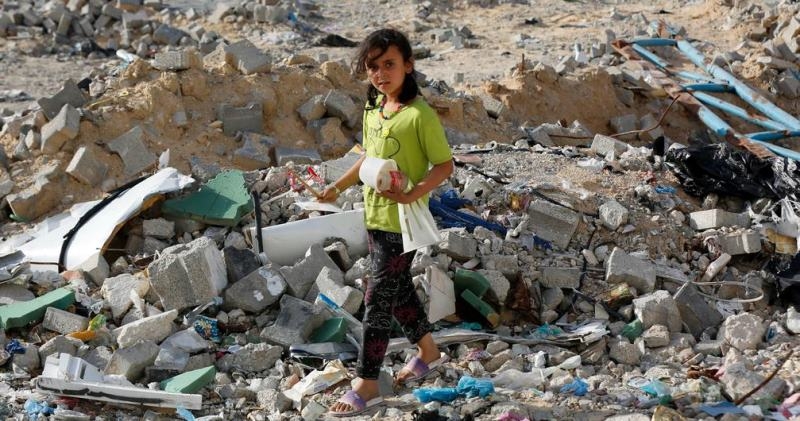- Yunus Urges Voters to Shape a ‘New Bangladesh’ |
- Bangladesh Polls: Campaign Ends as Voters Weigh Pledges |
- Bangladesh Heads to First Gen Z-Driven Competitive Poll |
- EC Lifts Mobile Phone Ban, Bars Photos Inside Booths |
- Youth participation vital to BD’s democratic future: C’wealth Group |
World court orders Israel: Halt military operations in Rafah

A child walks through the rubble in Rafah. © UNRWA
24 May 2024 - The International Court of Justice (ICJ) on Friday issued new provisional measures that order Israel to immediately end military operations in Rafah in southern Gaza and to open the governate’s border crossing for urgent aid deliveries.
This follows a request from South Africa in a pending case accusing Israel of violating its obligations under the Genocide Convention.
Reading the new provisional measures in an open session at the court in The Hague, ICJ Justice Nawaf Salam announced that Israel must abide by its obligations under the Genocide Convention to “immediately halt its military offensive and any other action in the Rafah governate which may inflict upon the Palestinian group in Gaza conditions of life that would bring about its physical destruction in whole and in part”.
The court issued that decision by 13 votes in favour to two against.
The new provisional measures came in response to South Africa’s request made on 10 May related to its initial accusations in December that Israel is violating its obligations under the Genocide Convention during the war in Gaza, which broke out after Hamas-led attacks on Israel in October that killed more than 1,200 people and left another 250 taken hostage.
Israel’s military response has, to date, killed nearly 36,000 Palestinians and caused widespread destruction and a looming famine in the besieged and bombarded enclave.
Court orders opening of Rafah border crossing
Given the worsening conditions on the ground since Israel’s incursion into Rafah on 7 May, the court decided, also by votes of 13 in favour to two against, the new provisional measures shall require Israel to open the Rafah crossing for the unhindered delivery of urgent humanitarian aid and ensure unimpeded access for fact-finding missions to investigate allegations of genocide.
The Rafah border crossing, which has been the main entry point for aid to the enclave, has been closed since 7 May.
“The court is not convinced that evacuation efforts and related measures that Israel has affirmed to have undertaken to enhance the security of civilians in the Gaza Strip, and in particular those recently displaced from the Rafah governate, are sufficient to alleviate immense risks to which the Palestinian population is exposed as a result of the military offensive in Rafah,” Mr. Salam said.
In addition, the ICJ ordered Israel to submit a report within one month on steps taken to implement these provisional measures.
Deteriorating conditions
Mr. Salam said the ICJ had noted that the situation in Gaza has deteriorated since it last issued provisional measures in March, adding that since Israel’s incursion into Rafah, the Najjar Hospital was no longer functioning and aid efforts have been impacted.
The court also noted that Israel’s evacuation orders for Rafah residents had led more than 800,000 people to flee to places like the coastal area of Al Mawasi, which lacked the basic essentials and services to accommodate them.
Since taking up South Africa’s case in January, the ICJ had already issued provisional measures in January and March by which Israel must, among other things, take all steps to ensure sufficient humanitarian aid enters Gaza.
However, UN agencies are reporting that scant aid is currently entering Gaza.
Court reiterates call to release hostages
On Friday, Mr. Salam recalled that in the two previous orders for provisional measures “the court expressed its grave concern over the fate of the hostages abducted during the attack in Israel on 7 October 2023 and held since then by Hamas and other armed groups, and called for their immediate and unconditional release.”
He said “the court finds it deeply troubling that many of these hostages remain in captivity and reiterates its call for their immediate and unconditional release.”
What’s the difference between the ICJ and the ICC?
There is frequent confusion between the International Criminal Court (ICC) and the International Court of Justice (ICJ). Both courts have open cases against Israel related to the ongoing conflict in Gaza.
The simplest way to explain the difference is that ICJ cases involve countries, and the ICC is a criminal court, which brings cases against individuals for war crimes or crimes against humanity. While the ICJ is an organ of the United Nations, the ICC is legally independent of the UN, although it is endorsed by the General Assembly.
The ICJ is currently considering South Africa’s accusations that Israel is violating the Genocide Convention.
On Monday, the ICC sought arrest warrants related to possible war crimes against three Hamas leaders and Israel’s Prime Minister, Benjamin Netanyahu, and Defence Minister Yoav Gallant. The request for the warrants are now being considered by the court’s judges.
Read more about the courts in our explainers on the ICJ and the ICC. – UN News

